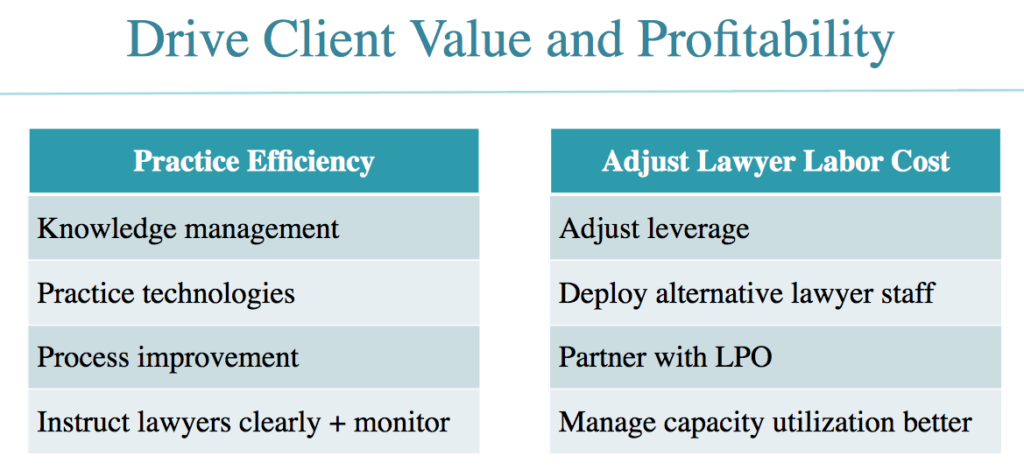Legal tech is much ballyhooed but is not enough to fix law firm and client problems. The publisher of Legal IT Insider, also known as the Orange Rag, recently asked “leading legal tech suppliers and high profile management consultants to do some future gazing on the opportunities, challenges and trends ahead, from both a supplier and law firm perspective.”
The answers were published in the January issue of Legal IT Insider and also appear on the web here. My response, below, suggests that legal tech talk can distract law firms and clients from the hard work of really changing how lawyers work.
Below my response, I include a figure that illustrates many other ways that lawyers can work differently to deliver more value. Technology is just one ingredient, perhaps a sobering thought for those attending Legal Tech NY next week.
Large law firms face a key 2017 opportunity and challenge, flip sides of the same coin: change how lawyers work.
Most large law firms face profit pressure and an uncertain future market position. To succeed – that is, to grow and maintain profits by keeping and winning clients – they must improve service delivery and value to clients.
Change to do this is in the air but not enough on the ground. Recent lawyer and firm interest in legal tech is unmatched in legal market history. Discussion of tech and innovation occurs daily. And it’s true many firms now use machine learning to accelerate due diligence. That is a good example of how tech incrementally changes how lawyers practice.
But firms and lawyers must go further. They must adopt other practice specific technologies that improve efficiency (output per hour). They must improve client service, for example, with faster turnaround and more informative communication about matter status.
Making such changes requires process improvement and delegating work to lower cost resources. That is hard. No one likes change. But lawyers do not like losing clients and shrinking profits. The key to avoiding that and to motivating change is clear. Firms must measure matter profitably accurately and tie partner compensation to profits. That is slowly happening.
How heady it is to talk about the wonders of legal tech, especially AI. And much easier than changing compensation and then working in new ways. But to recognize the wonders of tech, compensation must reward efficiency and drive change in how lawyers work. That will be very good for legal tech indeed. And for clients.
Illustration of improving of service delivery – legal tech is only a part of the answer.
Archives
Blog Categories
- Alternative Legal Provider (44)
- Artificial Intelligence (AI) (57)
- Bar Regulation (13)
- Best Practices (39)
- Big Data and Data Science (14)
- Blockchain (10)
- Bloomberg Biz of Law Summit – Live (6)
- Business Intelligence (21)
- Contract Management (21)
- Cool Legal Conferences (13)
- COVID-19 (11)
- Design (5)
- Do Less Law (40)
- eDiscovery and Litigation Support (165)
- Experience Management (12)
- Extranets (11)
- General (194)
- Innovation and Change Management (188)
- Interesting Technology (105)
- Knowledge Management (229)
- Law Department Management (20)
- Law Departments / Client Service (120)
- Law Factory v. Bet the Farm (30)
- Law Firm Service Delivery (128)
- Law Firm Staffing (27)
- Law Libraries (6)
- Legal market survey featured (6)
- Legal Process Improvement (27)
- Legal Project Management (26)
- Legal Secretaries – Their Future (17)
- Legal Tech Start-Ups (18)
- Litigation Finance (5)
- Low Cost Law Firm Centers (22)
- Management and Technology (179)
- Notices re this Blog (10)
- Online Legal Services (64)
- Outsourcing (141)
- Personal Productivity (40)
- Roundup (58)
- Structure of Legal Business (2)
- Supplier News (13)
- Visual Intelligence (14)

